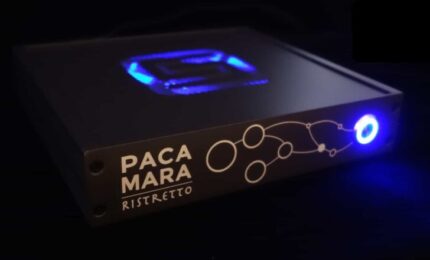Symbolic Sound introduces Pacamara Ristretto Audio Processing Unit, similar to a ‘GPU For Sound’
Symbolic Sound has introduced a new Audio Processing Unit (APU), Pacamara Ristretto, that they say offers a 2.5 times jump in performance, a 20% reduction in cost, cooler operating temperature, expanded connectivity options, and seamless inter-application routing of audio and MIDI to/from applications running on a host computer.
Similar to using a GPU for real-time graphics processing. Symbolic Sound’s APUs are designed to delivers high quality, real-time audio processing, while freeing up computing and memory resources on your computer that can be dedicated to other tasks.
What Symbolic Sound say about it:
“No matter how fast the CPU, your audio algorithms have to be designed to run alongside an unknown number of other audio applications and plug-ins, not to mention all the non-audio apps and system tasks that are continuously running in the background on your main computer (things like web browsers, background file-indexing, drivers, and other system tasks).
By shifting real-time audio computation to an APU designed for and dedicated to that task, not only can you improve the quality of your real-time audio signal processing algorithms, you can also free up memory and computing power on your main computer — resources that you can then use for handling other tasks.
Audio Processing Units are part of the landscape of ubiquitous computing you see everywhere around you — there are GPUs running alongside every CPU, there are 25 to 50 processors in the average car, there is a processor in each audio interface, a processor in each MIDI keyboard or controller; there are server processors dedicated to doing nothing but encryption; there are processors fully dedicated to bitcoin-mining, not to mention the CPUs and GPUs in your phone, your gaming consoles, your watch and in your thermostat. It makes sense to distribute computational tasks across multiple processors rather than expecting a single general-purpose computer to do it all — especially in applications when real-time* performance is required.”
“The Pacamara Ristretto represents a radical transformation, not just because it’s Symbolic Sound’s most powerful external APU yet, but because of the ease with which it communicates with the rest of the world,” said Symbolic Sound’s president Carla Scaletti. “Audio, MIDI, and OSC streams can be freely routed between Kyma and other audio applications on your computer and audio devices in your studio, including across LANs and out onto the Internet, creating a combinatorial explosion of sound creation possibilities.”
Audio professionals can leverage the full Kyma 7 accelerated sound design environment for rapid prototyping, testing, creative exploration, and refinement of production-quality sound synthesis and processing algorithms to run in real time on the Pacamara Ristretto.
Kyma, described as a “recombinant sound design environment,” gives sound designers access to extensive libraries of unique audio synthesis and processing modules, along with tools for creating limitless combinations of those algorithms. Galleries of automatically-generated signal flow graphs help speed development, spark the imagination and boost the creative flow — providing creators with the advanced models needed to solve sound design challenges for games, film, live music, data sonification, voice processing, multi-sensor controllers, and more.
The Pacamara Ristretto is as comprehensive in its connectivity as it is diminutive in size. The back panel includes:
- USB-C port for audio and MIDI transfer to/from host computer
- Two USB 2.0 ports for connecting audio interfaces and MIDI controllers
- 5 mm jack sockets for mic input and stereo headphone output
- RJ-45 network port to connect via a gigabit Ethernet cable to a host computer
- Wi-Fi antenna jack
- USB-C power input port
The Pacamara Ristretto is available today with the following pricing:
- The price for a 4-processor Pacamara Ristretto is $3,818
- An entry level, 2-processor system is available for $3,302
Kyma 7 software for macOS or Windows is included with the APU.
Initial supplies are limited, due to ongoing global electronic component shortages.



























